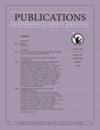α天鹅座(Deneb)脉冲的突然恢复
IF 7.7
3区 物理与天体物理
Q2 ASTRONOMY & ASTROPHYSICS
Publications of the Astronomical Society of the Pacific
Pub Date : 2023-12-01
DOI:10.1088/1538-3873/ad1118
引用次数: 0
摘要
帕多克(Paddock)1927-1935 年对α 天鹅座(Deneb)的径向速度研究显示,α 天鹅座的脉动是半规则的,主要周期约为 12 天。露西发现了许多振幅较小的周期。在帕多克的数据和后来 1956 年阿伯特的数据中,大振幅脉动似乎减弱后,新的脉动又在一天之内突然开始。其中五次恢复的时间间隔平均为 72.4 ± 0.3 天。这些恢复似乎可以在脉动过程中的任何阶段开始。我们没有在其他恒星中发现过这种现象。我们还在 Parthasarathy 和 Lambert 1977-1982 年的径向速度数据、Richardson 等人 1997-2001 年的测光/径向速度数据,以及 NASA Transiting Exoplanet Survey Satellite(TESS)航天器的测光数据和 AAVSO 国际数据库中的地基目视观测数据中找到了这种行为的证据。地基数据的采样间隔太短,无法确认 70 天的恢复间隔,也无法确定振幅突然增大的日期和相位。TESS 的数据以 2 分钟为一周期,显示了一次脉动恢复,但没有足够长的时间序列来确认 70 天的间隔。α天鹅座是发光蓝变星(超巨星)之一,这些脉动恢复可能与其大气层下对流层产生的微变、脉动驱动的冲击和稀有效应或脉动与对流的相互作用有关。我们鼓励地面观测者和 TESS 航天器进行进一步观测,以证实恢复间隔为 70 天,且径向速度和光曲线数据与脉冲相位缺乏相关性。本文章由计算机程序翻译,如有差异,请以英文原文为准。
The Abrupt Resumptions of Pulsations in α Cygni (Deneb)
Paddock’s 1927–1935 radial velocities of α Cygni (Deneb) show semi-regular pulsations with a dominant period of about 12 days. Lucy found many periods of lesser amplitude. In Paddock’s data and subsequent 1956 data from Abt, after the large-amplitude pulsations seemed to damp down, abruptly new sets of pulsations started within a fraction of a day. Five of those resumptions occurred with intervals averaging 72.4 ± 0.3 days. These resumptions seem to start at any phase during the pulsations. We are unaware of this behavior in any other star. We also find evidence of this behavior in the 1977–1982 radial velocity data of Parthasarathy & Lambert and the 1997–2001 photometry/radial velocity data of Richardson et al., as well as in photometric data from the NASA Transiting Exoplanet Survey Satellite (TESS) spacecraft and ground-based visual observations in the AAVSO International Database. The ground-based data have too infrequent sampling intervals to confirm the ∼70-day resumption intervals or to pinpoint the day and phase of abrupt amplitude increase. The TESS data, with 2-minute cadence, shows one instance of pulsation resumption, but does not have a long enough time series to confirm a 70-day interval. Without any evidence for duplicity, we cannot explain this behavior as being due to a companion in a highly eccentric orbit. α Cygni is one of the Luminous Blue Variables (supergiants) and these resumptions may be related to the microvariations produced in convective layers below their atmospheres, pulsation-driven shocks and rarefactions, or pulsation-convection interactions. We encourage further observations by ground-based observers and using the TESS spacecraft to confirm the ∼70-day resumption interval and lack of correlation with pulsation phase in both radial velocity and light curve data.
求助全文
通过发布文献求助,成功后即可免费获取论文全文。
去求助
来源期刊
CiteScore
6.70
自引率
5.70%
发文量
103
审稿时长
4-8 weeks
期刊介绍:
The Publications of the Astronomical Society of the Pacific (PASP), the technical journal of the Astronomical Society of the Pacific (ASP), has been published regularly since 1889, and is an integral part of the ASP''s mission to advance the science of astronomy and disseminate astronomical information. The journal provides an outlet for astronomical results of a scientific nature and serves to keep readers in touch with current astronomical research. It contains refereed research and instrumentation articles, invited and contributed reviews, tutorials, and dissertation summaries.

 求助内容:
求助内容: 应助结果提醒方式:
应助结果提醒方式:


